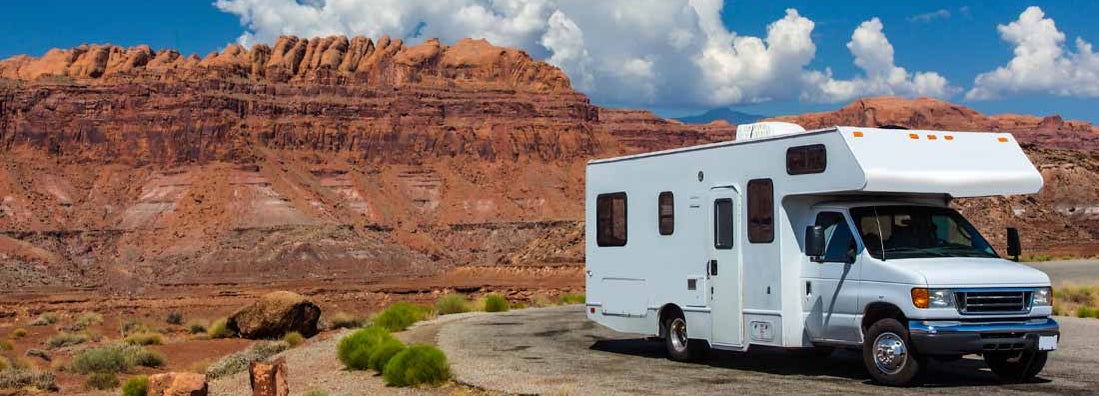RV Insurance in West Virginia
RV insurance can protect you from those unexpected incidents along the way.

Whether you use your RV or motorhome to visit West Virginia's Hawks Nest State Park or you are a road warrior whose home is wherever you park, RV insurance can protect you from those unexpected incidents along the way. Before you settle on quotes for RV insurance, it is important to bear in mind the following facts. You have worked hard and spent a lot of money acquiring the perfect vacation get-away in your RV. Finding the right insurance coverage can save you tens of thousands of dollars.
Contact a local independent insurance agent to find the best insurance plan in your area. You tell us what you’re looking for, and our technology will recommend the best agents for you. Any information you provide will be sent to only the agents you pick. We do not sell to third parties.
Why Is RV Insurance Important?
Each year in West Virginia, there are multiple highway collisions involving pull-behind recreational trailers that have flipped over due to high winds and "trailer sway." Trailer sway occurs when a big tractor-trailer passes a tow trailer on the interstate causing the trailer to oscillate or sway back and forth.
As far back as the 1960s, studies showed that people towing trailers and RVs were four times more likely to crash than the average motorist.
It's a common myth that auto or home insurance will adequately cover RVs and other vehicles. Your RVs are special and require specialized RV insurance. In some cases, you'll need additional insurance coverage.
Is Your RV Insurable?
What's the difference between RVs and travel trailers? From an insurance standpoint, not much besides the replacement cost of the vehicle (which can affect the cost of your policy). Whatever type of RV you have chosen to cruise West Virginia's beautiful highways and back roads, you can find the coverage to fit your needs. Compare the two types:
- Motor home insurance: This insurance covers recreational vehicles, permanently attached to a chassis or van, that provide you with temporary living quarters. The following are those types of RVs:
- Conventional motor home (Class A)
- Professional bus conversion (Class A)
- Non-professional bus conversion (Class A)
- Camper vans (Class B)
- Mini motor home (Class C)
- Travel trailer insurance and camper insurance: This insurance provides coverage for non-motorized, portable units designed to provide you with living quarters for recreational and camping use. Travel trailers and campers do not require special highway permits when towed. They include:
- Fifth wheel trailers
- Conventional trailers
- Pop-up tent trailers
- Trailers with recreational cargo quarters
- Mounted truck campers
Why Choose RV Insurance?
Your RV is more than a car, and your West Virginia RV insurance coverage should protect more than what typical car insurance does. Keep the following in mind as you decide whether to buy RV insurance coverage since standard auto insurance policies generally don't cover the following situations:
- You keep things in your RV that you wouldn't keep in your car such as clothing, jewelry, binoculars, VCRs, laptops, camcorders, or outdoor gear.
- When you park your RV at a WV campsite, you may be liable for the area around your RV. You may be responsible for someone else's injury.
- If your RV sustains damage while you're traveling, you'll need a place to stay and a way to get there.
All of the above scenarios could end up costing you thousands of dollars. However, when you insure your RV on its own policy, you'll know you have a wide range of RV insurance coverage for a wide range of incidents.
What Does RV Insurance Cover?
RV insurance can protect you from losses due to accidents and injuries and comes in many coverage options to choose from, such as the following:
- Bodily injury and property damage liability
- Uninsured/underinsured motorists
- Medical payments
Comprehensive and collision options include the following:
- Market value
- Agreed value
- Total loss replacement cost
- Roadside assistance
- Emergency expense
- Replacement cost for personal effects
- Vacation liability
- Trailer coverage
- Fire department service charge
- Full timer's package
What Kind of RV Insurance Policy Should You Get?
Comprehensive and collision cover the cost to repair or replace your RV due to theft or damage in an accident, regardless of who is at fault. You select a deductible for each coverage type and, once you meet the deductible, the insurance company pays for the remaining damage.
With collision coverage, your insurance company pays for damage to your RV when you collide with another vehicle or object. If you hit a car, a pole or another non-living object, collision coverage will apply.
With comprehensive, or "other than collision" coverage, your insurance company pays for damage to your RV caused by an event other than a collision, such as fire, theft or vandalism. If you hit an animal, or if your RV catches fire or is stolen, comprehensive coverage will apply.
You have three options to insure your RV against a total loss:
- Market value: A base policy that pays the actual value of your RV at the time of loss
- Agreed value: Pays the value of your RV that you select at the start of your policy, regardless of the current market value
- Total loss replacement cost: Pays for replacement of your RV with the newest model if your insurer declares your RV a total loss within its first five model years
How Much Will My RV Insurance Quote Be?
The cost of your RV insurance will depend on whether you are full-timer or a weekend enthusiast.
These additional factors will affect the quotes you get:
- The type of RV you drive: There are many kinds of motorhomes, so it is nearly impossible to get an estimate without knowing the particulars of your RV make and model.
- The age and condition of your RV: Even when comparing two relatively new RVs of the same make and model, there will be differences in value based on wear and tear.
- Your experience driving an RV: Driving a motorhome is very different from driving a car. The more experience you have as an RV driver, the less risky you are to insure.
- Accidents and traffic violations: Your history as a driver matters. If you have been in several accidents or have a number of traffic tickets, an insurance company will consider you at greater risk for another accident.
- Where you live: If you live an area of West Virginia with higher rates of accidents and thefts, your insurance cost will likely be higher. Areas with mountainous terrain or severe weather conditions, such as thunderstorms and blizzards, typically have more dangerous road conditions.
- The type and amount of insurance you buy: Even taking into account all of the factors above, the typical cost you can expect to pay for your motorhome insurance will depend upon what you get and where you set your limits.
Take Away Message: Get Prepared Before You Go
Don't let an accident or injury derail your RV vacation plans. Contact a local independent insurance agent to find the most affordable quotes on the best RV insurance policies available in West Virginia. You'll be packing up the family and hitting the road in minutes.
